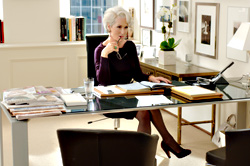BEING A PRINCESS used to require a little more effort of Anne Hathaway, and she also had a lot more help from Julie Andrews, who’d probably be called a “life coach” in today’s self-actualization industry. Not that there’s ever any doubt as to Hathaway’s ultimate actualization in The Devil Wears Prada, adapted from Lauren Weisberger’s best-selling roman à clef about working for Anna Wintour at Vogue magazine. Hathaway’s naive, corn-fed heroine arrives at Runway without a clue about fashion or her famously feared boss, Miranda (Meryl Streep), whose hair and voice appear to be made of the same platinum alloy—expensive, unyielding, impenetrable. Why does this imperious editor hire the obviously unqualified Andy (aka Andrea), a studious twerp who wrote about janitors’ unions in college? Devil breaks its first stiletto heel in the metal subway grate of reality when Andy, unlike the other gaunt minions cowering in the halls, dares to talk back to her. Excuse me, but in the entry-level world of New York publishing, you can talk back to the coffee machine while you’re fetching a cup for your boss.
Soon Andy is racing down the corridors of Runway, frantically fielding cell phone demands at all hours, sprinting a Seventh Avenue fashion marathon in high heels—once she learns to wear them, part of the inevitable makeover courtesy of the mag’s sympathetic gay art director (Stanley Tucci). To make being a flunky seem more exciting than it actually is, and to disguise the absence of any real drama in the film, director David Frankel fills about half its run time with Andy simply running in montage to a series of pop songs. Of course, “Vogue” makes ridiculous her qualms about authenticity. As Madonna would tell her, whether fashionista, career girl, serious journalist, committed girlfriend—it’s all just a pose, one no more important than the other.
Yet the movie insists that Andy’s couture ordeal must mean something. Though she never writes a single word for Runway, we are to believe she’s part of a grand publishing tradition that has dictated hemlines, changed hairstyles, and printed the work of Jay McInerney! Her wacky friends are won over by the gift-bag gimmes she bestows upon them, and her chef boyfriend (Adrian Grenier) has his doubts pushed away, for a time, by her push-up bustier (from the magazine’s closet arsenal of apparel, so much better than free pens and notepads).
This institutional reverence means Andy must eventually respect Miranda for her über-competence, and that Miranda must eventually be humanized—she must pay the price for valuing career over personal life. “I see a great deal of myself in you,” Miranda tells our heroine, who responds as if the judge has read her a death sentence.
Devil never advances beyond a book that was fundamentally about making appointments, processing complicated orders at Starbucks, and bitching about it. Andy’s job, lackey, is made to sound like an important career step because everyone keeps telling her it is. Her humiliations aren’t particularly funny, either. (Would it be wrong to ask that one of those precious Starbucks orders be spilled on a layout?) Though director Frankel comes from Sex and the City and Entourage, Andy is no Carrie Bradshaw—Hathaway is pretty, even while frumped up in plaid and sweaters early on, but those doe eyes don’t show much neurosis or self-doubt.
YOU’RE LEFT, finally, to consider the gorgeous trimmings on the fitting-room floor, the fabrics for a superior garment. Tucci, while playing one of those curiously nongay gays identified by tailoring instead of behavior, gives the warmth that Streep isn’t permitted to show. And Streep, steel mask on, almost convinces you that fashion is important; mask off, she reveals the battle fatigue of any career—movie stardom included, I suspect.
But the movie’s problem comes down to this: It’s about the wrong girl. English actress Emily Blunt (the haughty seducer in My Summer of Love) plays Hathaway’s rival, Emily, jealously guarding her status as Miranda’s No. 1 assistant, scornful of the rube destined to replace her. Only Blunt seems to understand what Devil should’ve been—an enjoyable Bridget Jones knockoff. She sees, as we do, that Andy can’t lose, and her panic only causes her to make a bigger mess of things. Which is why we rooted for Bridget, and her unlikely success raised a cheer. Starving herself for fashion, a young woman about to be replaced by this year’s model, Emily moans at her desk, “I love my job, I love my job,” like she’s got a terminal disease. Viewers will know the feeling—it’s called work, which Devil isn’t prepared to do.








